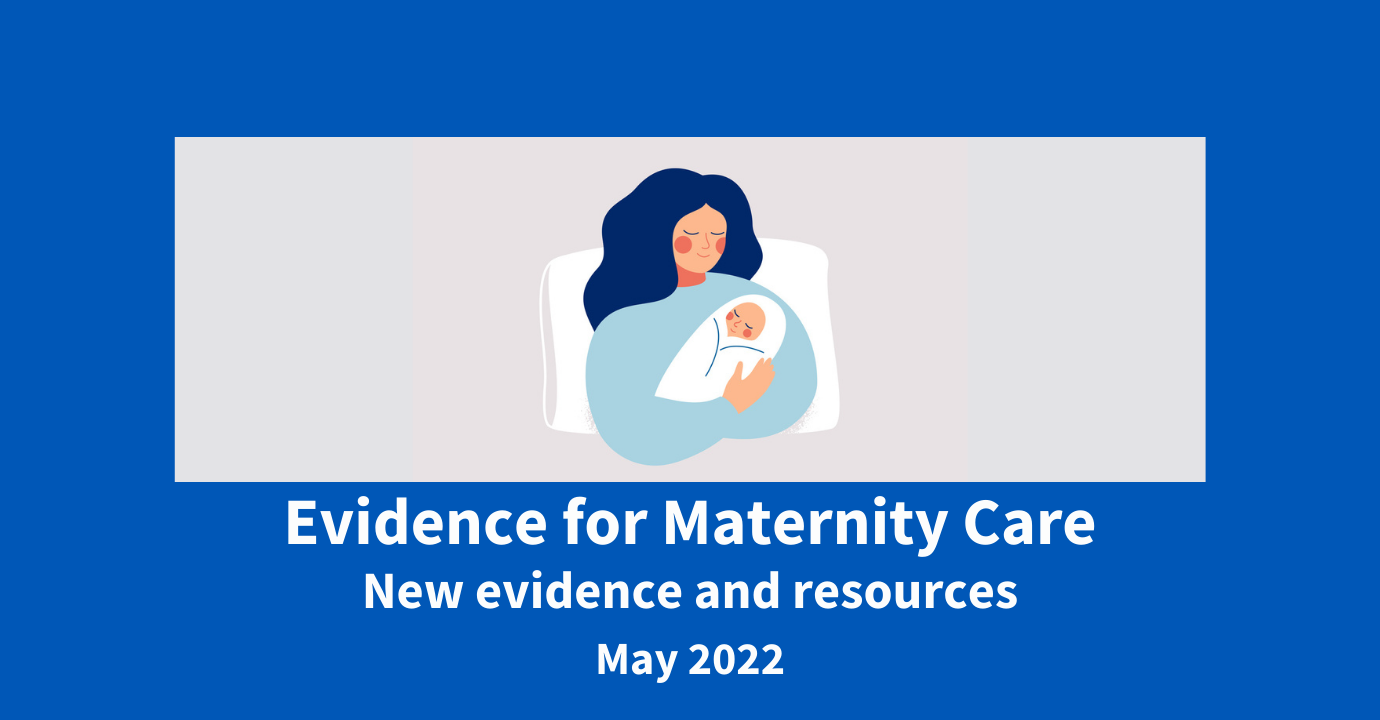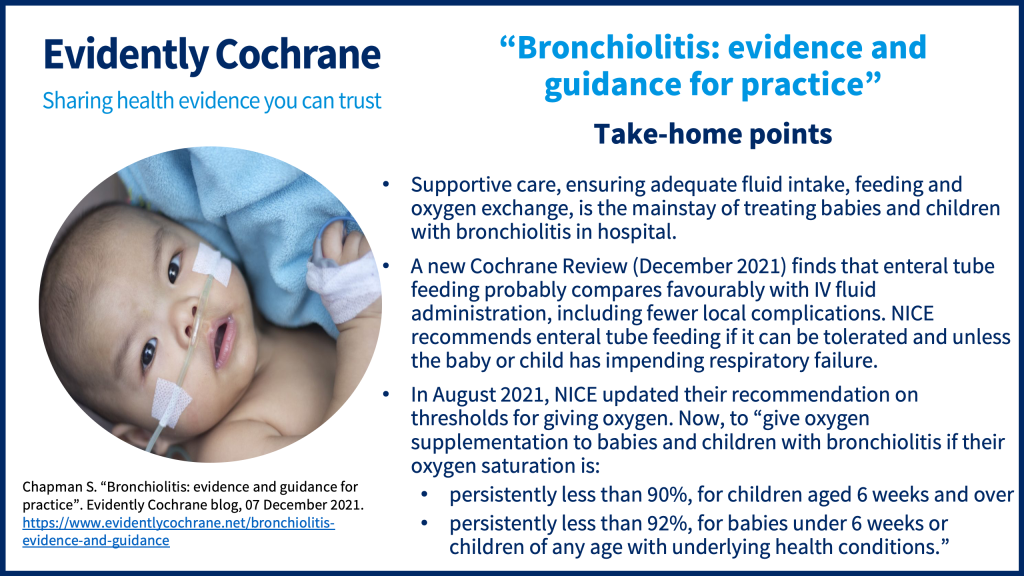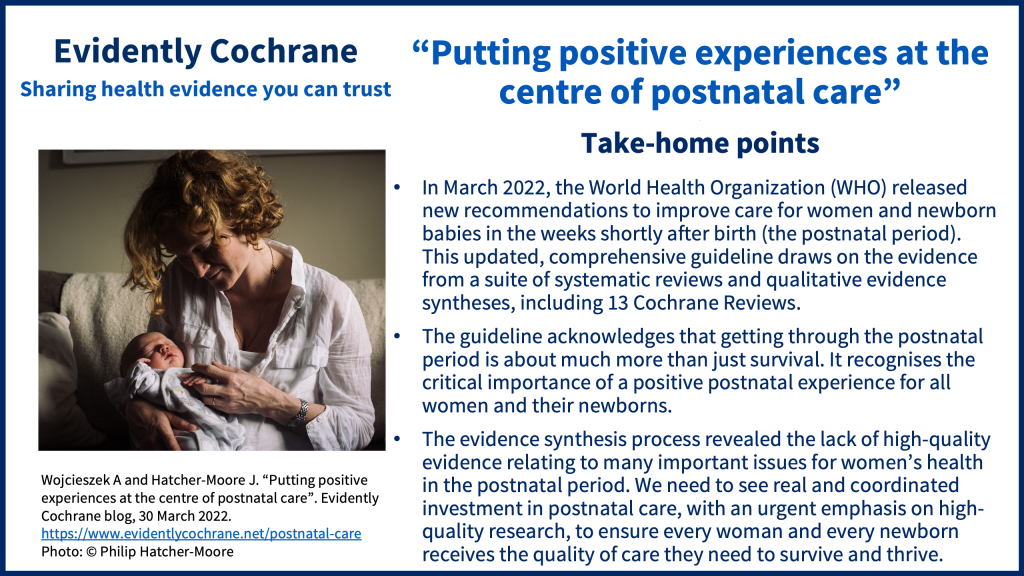The latest evidence and resources for midwives and clinical support staff, and a chance to help us improve these blogs. You can either scroll through this page or click on any of the links below to jump to the relevant section.
Please note, unlike the rest of our blogs, our ‘Evidence for Maternity Care: new evidence and resources’ blogs will not be updated.
- Your feedback: can you help us find out whether our regular evidence round-up blogs are useful and how we can make them better?
- Finding the Cochrane evidence you need has got easier
- COVID-19
- Antenatal care
- Labour and birth
- Postnatal care, including care of the newborn, including preterm infants
- News and opportunities: a free webinar for nurses, midwives and allied health professionals
1
Cochrane UK needs you!
Can you help us find out whether our regular evidence round-up blogs are useful and how we can make them better?
These blogs are a way of bringing you news of the latest evidence from Cochrane, relevant to your professional group. Unlike our other blogs, these do not go into detail about the topics and the evidence, nor do they provide a personal or professional reflection. Rather, they provide a brief summary of recently-published Cochrane Reviews and flag up related products and resources, as well as news and opportunities.
We want to make sure we are providing something that is useful to you in your practice. To do this, we need your help.
We are looking for midwives, clinical support staff and student midwives.
If you can spare a few minutes, it would be great if you could share your thoughts in a comment on this blog (simply post a comment at the bottom of the page). There are some questions below you might like to consider.
If you can spare a bit longer, and you are based in the UK, please consider helping us with the task below which involves you reading two of these blogs and then chatting with either Sarah or Selena on Zoom for up to 30 minutes at a date and time convenient to you. If you are interested, please get in touch via feedback@evidentlycochrane.net.
We want to know what you think (this is not a test!)
The task:
Please read this blog and the previous blog in the series: a round-up of new evidence and resources – March 2022. Do this in whatever way you naturally would (for example, concentrating on the bits relevant to you). While you are reading, please think about these questions:
- What do you think about the topic coverage? Are the topics right? Are we missing things? Please note the topics vary, depending on what new evidence we have to share.
- Is the blog organised in a way that is useful and makes sense to you?
- What do you think of the information that is given? For example, would you like more, less, or different detail?
- What would you do with any of this information? (For example, share it with colleagues).
- Where do you normally look for evidence?
- How often would you like to see these blogs published?
- Are there any other changes you would like to suggest?
If it is helpful for you to have evidence of your contribution to helping us at Cochrane UK improve our evidence products, we can provide this.
Thank you!
2
Finding the Cochrane evidence you need has got easier!
You can now find exactly the evidence you need: at-a-glance PICO summaries are now available with Cochrane Abstracts. With the new feature of including PICO terms (Population, Intervention, Comparison, and Outcomes) on review pages, you’ll be able to find the most relevant Cochrane evidence to answer your research or clinical question.
3
COVID-19
Cochrane is continuing to produce new and updated reviews in response to the pandemic. We have blogged about many of them and this blog COVID-19 evidence: a Cochrane round-up brings together a large collection of evidence and resources, starting from when this evidence was first being produced in spring 2020.
Plus, we have two blogs on COVID-19 treatments:
The blog on treatments for people hospitalised with Covid includes the recent Cochrane Review, Anticoagulants for people hospitalised with COVID‐19 (published March 2022). Like the reviews themselves, all our blogs are updated to reflect new evidence.
The Cochrane Review on Hydroxychloroquine for prevention and treatment of COVID‐19 was joint winner of 2021 Harding Prize for Useful and Trustworthy Communication. Praising the review, the judges commented that “the Cochrane approach delivered rigorous, trustworthy and balanced reviews of scientific papers communicated with clarity and directness. Such reviews enabled policy makers, journalists and the public to discuss and make decisions based on the best evidence.”
Cochrane Special Collections
Cochrane Special Collections assemble Cochrane Reviews on important topics for the prevention and treatment of COVID-19. They are developed with experts from our global Cochrane network. They are based on World Health Organization interim guidance, and continuously updated. You can find Coronavirus (COVID-19) Special Collections here.
Recently updated special collections include:
- Coronavirus (COVID-19): evidence relevant to acute and critical care
- Coronavirus (COVID-19): infection control and prevention measures.
Cochrane Podcasts
Cochrane COVID-19 Podcasts offer short summaries of Cochrane COVID-19 reviews from the authors themselves. A good way to hear the latest Cochrane evidence in under 5 minutes each.
Cochrane Clinical Answers
Cochrane Clinical Answers (CCAs) provide a readable, digestible, clinically-focused entry point to rigorous research from Cochrane Reviews. They are designed to be actionable and to inform point-of-care decision-making. Each CCA contains a clinical question, a short answer, and data for the outcomes from the Cochrane Review deemed most relevant to practising healthcare professionals.
You can find Cochrane Clinical Answers related to COVID-19 here.
4
Antenatal care
Betamethasone before elective section
Cochrane Clinical Answer: Does antenatal betamethasone prior to elective cesarean section at term help improve neonatal outcomes?
Prenatal corticosteroids for women at risk of preterm birth
The authors of the Cochrane Review Repeat doses of prenatal corticosteroids for women at risk of preterm birth for improving neonatal health outcomes (April 2022) conclude that:
- “The short‐term benefits for babies included less respiratory distress and fewer serious health problems in the first few weeks after birth with repeat dose(s) of prenatal corticosteroids for women still at risk of preterm birth seven days or more after an initial course.
- The current available evidence reassuringly shows no significant harm for the women or child in early and mid‐childhood, although no benefit.
- Further research is needed on the long‐term benefits and risks for the baby into adulthood.”
Routine ultrasound for foetal assessment
Cochrane Clinical Answer: What are the benefits and harms of routine ultrasound for fetal assessment before 24 weeks’ gestation in women with low‐risk pregnancies?
5
Labour and birth
Routine vaginal examinations and other methods for assessing progress of labour
A Cochrane Review Routine vaginal examinations compared to other methods for assessing progress of labour to improve outcomes for women and babies at term (March 2022) highlights continued uncertainty about which method is most effective or acceptable for assessing the progress of labour.
6
Postnatal care, including care of the newborn, including preterm infants
Cuffed versus uncuffed endotracheal tubes for neonates
The Cochrane Review Cuffed versus uncuffed endotracheal tubes for neonates (January 2022) highlighted an evidence gap on the benefits and harms of cuffed (inflated or non-inflated) endotracheal tubes (ETTs) compared with uncuffed ETTs for respiratory support in neonates.
Cochrane Clinical Answer: How do cuffed endotracheal tubes compare with uncuffed endotracheal tubes for neonates and young infants requiring mechanical ventilation?
Enteral feeds
Cochrane Clinical Answer: How does delaying the introduction of progressive enteral feeds affect outcomes in very preterm or very low birth weight infants?
Transient tachypnoea of the newborn
Podcast: Treatments to manage rapid breathing in babies (transient tachypnoea of the newborn). Two Cochrane Review authors discuss the findings of their recent overview: Interventions for the management of transient tachypnoea of the newborn ‐ an overview of systematic reviews (February 2022).
Respiratory syncytial virus (RSV) infection in infants
Cochrane Clinical Answer: Does palivizumab help prevent severe respiratory syncytial virus (RSV) infection in infants?
We also have a recently updated blog on Bronchiolitis: evidence and guidance for practice.
WHO postnatal care guideline
News item: WHO postnatal care guideline supported by 13 Cochrane Reviews.
We have a new blog on this: Putting positive experiences at the centre of postnatal care by Aleena Wojcieszek and Jessica Hatcher-Moore, who have both worked on the new guideline.
7
News and opportunities
Cochrane UK and Cochrane Ireland are hosting a free online workshop for nurses, midwives and allied health professionals based in the UK and Ireland. Join us on Tuesday 14th June, from 14:00 to 16:00, for a practical session where you will learn more about systematic reviews and improve your understanding of evidence-based practice. Full details, including how to register.
Please note that this page includes a round-up of materials mainly published within the last two months, and is not updated after it’s posted.
Join in the conversation on Twitter with @SarahChapman30 and @CochraneUK or leave a comment on the blog.
Please note, we cannot give medical advice and do not publish comments that link to individual pages requesting donations or to commercial sites, or appear to endorse commercial products. We welcome diverse views and encourage discussion but we ask that comments are respectful and reserve the right to not publish any we consider offensive. Cochrane UK does not fact check – or endorse – readers’ comments, including any treatments mentioned.
Sarah and Selena have nothing to disclose.




